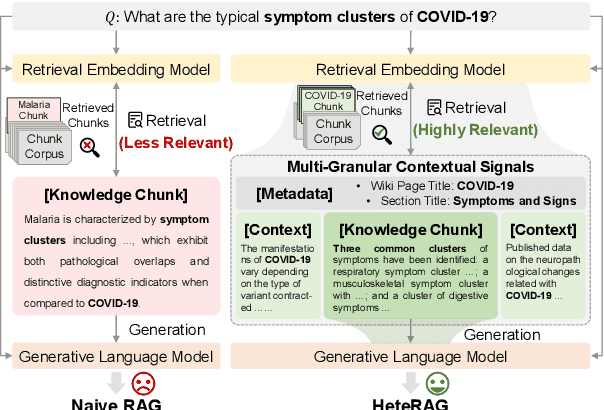Peiru Yang
RedNote-Vibe: A Dataset for Capturing Temporal Dynamics of AI-Generated Text in Social Media
Sep 26, 2025



Abstract:The proliferation of Large Language Models (LLMs) has led to widespread AI-Generated Text (AIGT) on social media platforms, creating unique challenges where content dynamics are driven by user engagement and evolve over time. However, existing datasets mainly depict static AIGT detection. In this work, we introduce RedNote-Vibe, the first longitudinal (5-years) dataset for social media AIGT analysis. This dataset is sourced from Xiaohongshu platform, containing user engagement metrics (e.g., likes, comments) and timestamps spanning from the pre-LLM period to July 2025, which enables research into the temporal dynamics and user interaction patterns of AIGT. Furthermore, to detect AIGT in the context of social media, we propose PsychoLinguistic AIGT Detection Framework (PLAD), an interpretable approach that leverages psycholinguistic features. Our experiments show that PLAD achieves superior detection performance and provides insights into the signatures distinguishing human and AI-generated content. More importantly, it reveals the complex relationship between these linguistic features and social media engagement. The dataset is available at https://github.com/testuser03158/RedNote-Vibe.
MrM: Black-Box Membership Inference Attacks against Multimodal RAG Systems
Jun 09, 2025



Abstract:Multimodal retrieval-augmented generation (RAG) systems enhance large vision-language models by integrating cross-modal knowledge, enabling their increasing adoption across real-world multimodal tasks. These knowledge databases may contain sensitive information that requires privacy protection. However, multimodal RAG systems inherently grant external users indirect access to such data, making them potentially vulnerable to privacy attacks, particularly membership inference attacks (MIAs). % Existing MIA methods targeting RAG systems predominantly focus on the textual modality, while the visual modality remains relatively underexplored. To bridge this gap, we propose MrM, the first black-box MIA framework targeted at multimodal RAG systems. It utilizes a multi-object data perturbation framework constrained by counterfactual attacks, which can concurrently induce the RAG systems to retrieve the target data and generate information that leaks the membership information. Our method first employs an object-aware data perturbation method to constrain the perturbation to key semantics and ensure successful retrieval. Building on this, we design a counterfact-informed mask selection strategy to prioritize the most informative masked regions, aiming to eliminate the interference of model self-knowledge and amplify attack efficacy. Finally, we perform statistical membership inference by modeling query trials to extract features that reflect the reconstruction of masked semantics from response patterns. Experiments on two visual datasets and eight mainstream commercial visual-language models (e.g., GPT-4o, Gemini-2) demonstrate that MrM achieves consistently strong performance across both sample-level and set-level evaluations, and remains robust under adaptive defenses.
HeteRAG: A Heterogeneous Retrieval-augmented Generation Framework with Decoupled Knowledge Representations
Apr 12, 2025



Abstract:Retrieval-augmented generation (RAG) methods can enhance the performance of LLMs by incorporating retrieved knowledge chunks into the generation process. In general, the retrieval and generation steps usually have different requirements for these knowledge chunks. The retrieval step benefits from comprehensive information to improve retrieval accuracy, whereas excessively long chunks may introduce redundant contextual information, thereby diminishing both the effectiveness and efficiency of the generation process. However, existing RAG methods typically employ identical representations of knowledge chunks for both retrieval and generation, resulting in suboptimal performance. In this paper, we propose a heterogeneous RAG framework (\myname) that decouples the representations of knowledge chunks for retrieval and generation, thereby enhancing the LLMs in both effectiveness and efficiency. Specifically, we utilize short chunks to represent knowledge to adapt the generation step and utilize the corresponding chunk with its contextual information from multi-granular views to enhance retrieval accuracy. We further introduce an adaptive prompt tuning method for the retrieval model to adapt the heterogeneous retrieval augmented generation process. Extensive experiments demonstrate that \myname achieves significant improvements compared to baselines.
HieRec: Hierarchical User Interest Modeling for Personalized News Recommendation
Jun 08, 2021



Abstract:User interest modeling is critical for personalized news recommendation. Existing news recommendation methods usually learn a single user embedding for each user from their previous behaviors to represent their overall interest. However, user interest is usually diverse and multi-grained, which is difficult to be accurately modeled by a single user embedding. In this paper, we propose a news recommendation method with hierarchical user interest modeling, named HieRec. Instead of a single user embedding, in our method each user is represented in a hierarchical interest tree to better capture their diverse and multi-grained interest in news. We use a three-level hierarchy to represent 1) overall user interest; 2) user interest in coarse-grained topics like sports; and 3) user interest in fine-grained topics like football. Moreover, we propose a hierarchical user interest matching framework to match candidate news with different levels of user interest for more accurate user interest targeting. Extensive experiments on two real-world datasets validate our method can effectively improve the performance of user modeling for personalized news recommendation.
 Add to Chrome
Add to Chrome Add to Firefox
Add to Firefox Add to Edge
Add to Edge